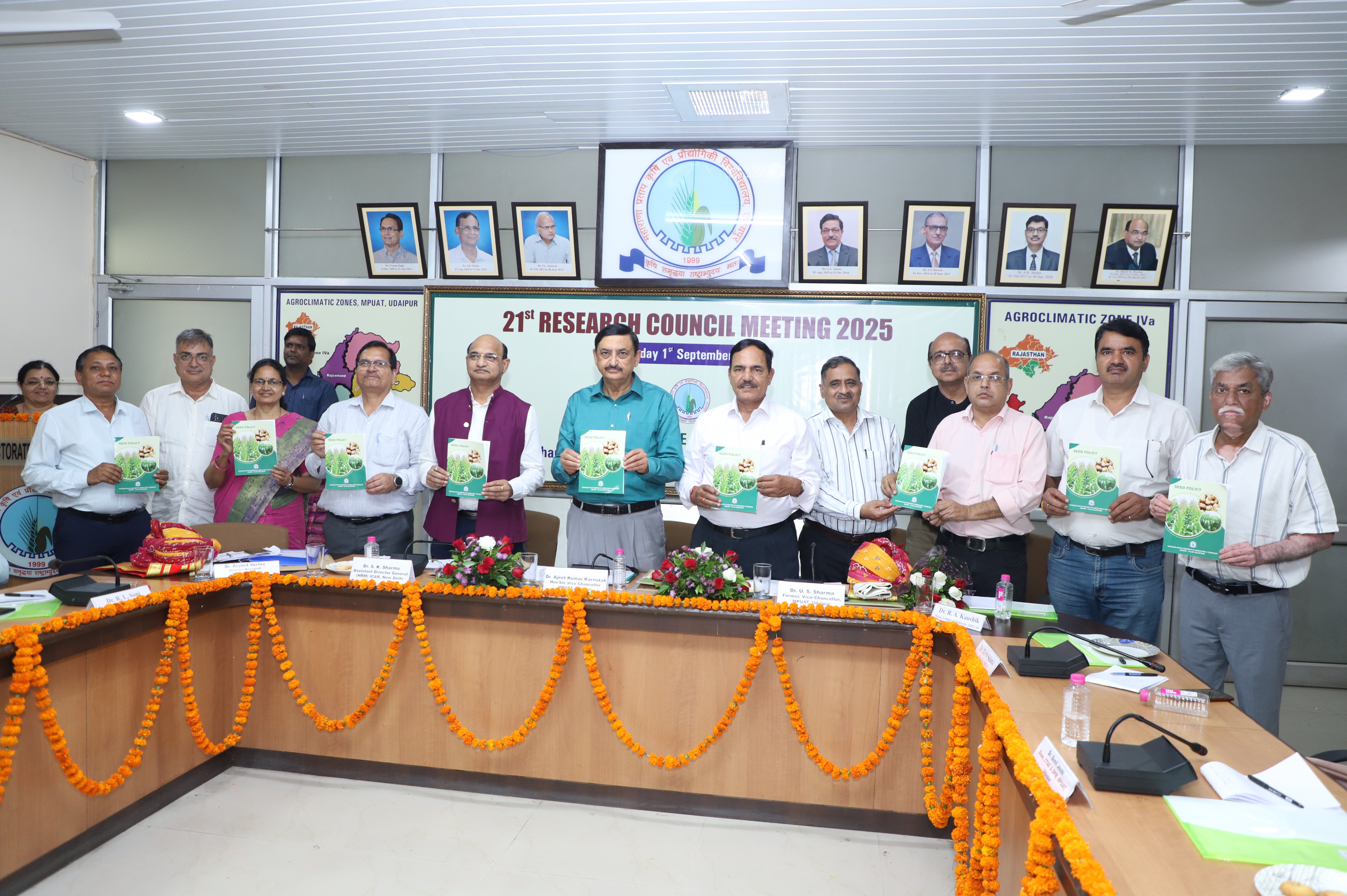#### MPUAT: 21st Research Council Meeting Concludes
Experts Shared Their Valuable Suggestions

Udaipur, The 21st meeting of the Research Council of Maharana Pratap University of Agriculture and Technology (MPUAT), Udaipur, was held on Monday, September 1, 2025, at the Directorate of Research under the chairmanship of University Vice Chancellor, Dr. Ajit Kumar Karnataka.
Addressing the scientists, Dr. Karnataka stated that MPUAT is a leading institution in agricultural research. He highlighted that the university has developed improved new varieties of maize, groundnut, and opium, and that during 2023 and 2024, MPUAT scientists earned 34 individual honors at the national level, while two projects received prestigious awards. He further shared that the university entered into several MoUs with different institutions. The Vice Chancellor encouraged scientists to align their research work with time-bound goals and stakeholder needs so that producers, marketers, and consumers alike could benefit. He emphasized that research projects should also aim at revenue generation for the university, expressing confidence that new technologies and patents will enhance the university’s income. He further added that research programs must be designed in alignment with national goals and should indirectly or directly contribute to strengthening the national economy, infrastructure, supply-demand balance, and the farming community. Dr. Karnataka warmly welcomed invited experts Dr. S.K. Sharma, Assistant Director General (Human Resources), ICAR, New Delhi, and Dr. Uma Shankar Sharma, former Vice Chancellor, MPUAT, Udaipur.
On the occasion, Dr. S.K. Sharma suggested that the university must focus on the development and value addition of unique agricultural products from its region, which would not only benefit the farmers but also raise MPUAT’s reputation globally. He stressed that research outcomes must be disseminated through FPOs and other groups so that they remain relevant and useful for farmers and society. Dr. Sharma recommended that every university farm should focus on producing breeder seeds to increase revenue. Highlighting the vision of Viksit Bharat 2047, he called attention to water-use efficiency, renewable energy, ethanol production from maize, and improving low-fertility soils. He urged scientists to focus on the commercialization of patents for revenue generation and emphasized that advanced technologies developed by the university must be made available on its website to ensure global visibility.
Invited expert Dr. Uma Shankar Sharma, former Vice Chancellor, MPUAT, noted that climate change has emerged as a major challenge, impacting not only field crops but also horticulture crops, fisheries, and poultry farming. He stressed the need for strategies such as temperature management and improving soil carbon levels. Highlighting the importance of water management, he suggested that integrated farming systems should focus on horticultural crops and livestock rather than only cereal-based models, to increase farmers’ income. He also underlined the need for mechanization from sowing to value addition. Dr. Sharma advised including horticulture crops and exotic mushroom cultivation in integrated systems, recommending year-round mushroom cultivation based on market demand. He also emphasized establishing a Center of Excellence for local vegetables and urged research on agroforestry crops.
At the beginning of the meeting, Director of Research Dr. Arvind Verma welcomed Vice Chancellor Dr. Ajit Kumar Karnataka, former Vice Chancellor Dr. Uma Shankar Sharma, and ICAR ADG (HR) Dr. S.K. Sharma. Dr. Verma presented the follow-up report on decisions taken in the 20th Research Council meeting, along with an overview of the agricultural research carried out by the university in the past two years. Presentations were also made by Dr. Amit Trivedi, Regional Director, Agricultural Research Station, Udaipur, and Dr. Hargilas Meena, Regional Director, Agricultural Research Station, Banswara, on the research work and outcomes in their respective areas.
During the meeting, a Seed Policy Bulletin authored by various scientists of the Directorate of Research was released. The meeting was attended by university directors, deans of constituent colleges, regional directors of agricultural research stations, project in-charges, department heads, and officials of the Department of Agriculture, Government of Rajasthan.
साभार :
© CopyRight Pressnote.in | A Avid Web Solutions Venture.






